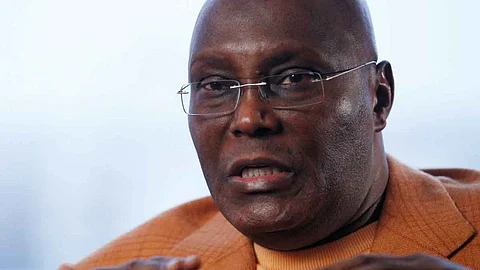

The race to become president of the federal republic of Nigeria is becoming interesting with the involvement of big-time political characters like Atiku Abubakar, Bola Ahmed Tinubu and Peter Gregory Obi. With the way Nigeria has slowly changed into an uncertain country to live in, many people are looking forward to a change. The 2023 presidential election will determine if Nigeria can get it right again or not.
The political parties, with their respective candidates, have declared their capability and what they intend to do if elected president.
In this article, we will look at the proposed policies of the Peoples Democratic Party’s presidential candidate, Alhaji Atiku Abubakar, and what he intends to do for Nigerians if he eventually becomes president.
Atiku’s 5-point development agenda
Alhaji Atiku Abubakar in his meeting with the Nigeria Guild of Editors in Lagos, declared his manifestoes which he tagged his plan for Nigeria.
The PDP’s presidential candidate claims to be offering himself once more to offer the desired leadership. He asserted that he had a track record of political and economic reform. He stressed that he had extensive knowledge of Nigeria's economy and its difficulties as a long-time private businessman.
He highlighted his achievements as a Vice President of the country, stating that his administration was determined to change and put the NEEDS and SEEDS formal development strategy into practice.
He continued by saying that in his capacity as the leader of the economic management team, he played a key role in creating a plan to revive the private sector and promoted the opening of the economy to private sector investment in the IT industry. It is, without a doubt, the Nigerian economy's fastest-growing sector of services.
Atiku stated that the plan would be based on three fundamental principles: increased private sector involvement, the end of government monopolies in infrastructure, such as refineries, rail transportation, and power transmission, increased market leverage in price determination, and the eradication of persistent price distortion brought on by interventionist exchange rate management policy.
The PDP candidate pledged to raise the country's Gross Domestic Product (GDP) from $2,000 to $5,000 by 2030, achieve economic diversification, increase the export of goods related to manufacturing, oil, and gas, develop a knowledge-based economy, and advance inclusion by helping the poor escape poverty and create jobs.
Atiku stressed the importance of the power sector reform, saying that by 2030, Nigeria would have made significant progress in diversifying its energy sources and producing up to 25,000 megawatts. In addition, Atiku pledged to build 70,000 kilometres of paved roads, 5,000 kilometres of contemporary railway lines, and one million housing units through private sector-led initiatives.
According to the former vice president, institutions in the oil and gas sector would be managed with greater efficiency and transparency. He added that new licences for Greenfield investments in the refining of crude oil would be awarded after the sale of all government-owned refineries.
According to Atiku, he will reorient education by fostering scientific and technological research, a strong health care system, vocational training, and assistance for those with special needs.
The one-time vice president campaigned on creating a just society where individuals' rights will be upheld and an inclusive governing framework to capitalise on the nation's diversity.
He stated that, if elected, his government would increase rules and measures for identifying corruption through a solid technology infrastructure that supports the end-to-end operations of governmental companies for openness, accountability, efficiency, and effectiveness. Along with that, he pledged to strengthen policies on witness and whistleblower protection.
Atiku and his new covenant for Nigeria
Alhaji Atiku Abubakar, a former vice president and the Peoples Democratic Party's (PDP) presidential candidate, has stated that the PDP's loss of the 2019 election was a significant setback for the country given his desire to bring about lasting change.
A summarized version of his policy statement, titled "My covenant with Nigerians," was released. Mr. Abubakar recalled his 2019 policy document, which was unable to be put into action for the benefit of Nigerians due to the PDP's defeat. He bemoaned the failure of the current APC leadership, saying it had resulted in misery that was plainly visible to everyone.
The summarized policy statement, which was reduced to a 5-point development agenda, aims to reunite Nigeria via equality, social justice, and intergroup cooperation.
According to the policy, Atiku would set up a robust and competent democratic government that would ensure the protection of people and their property. Furthermore, the former vice president will establish a strong and flourishing economy upon taking office again, generating riches and jobs while helping millions of people escape poverty.
According to the covenant, Atiku Abubakar's administration will prioritize promoting a robust and authentic federal system.
Its policy plan would include, among other things, strengthening and improving the educational system and giving students the tools they need to compete in the "new global order, which is driven by science and technology."
According to Atiku, if they comprehend those mentioned above, the public can hold him responsible if he doesn't fulfill the social contract projections.
Atiku’s running mate 2023
A governor from the oil-producing Delta state was chosen by Atiku Abubakar as his running mate for the 2023 presidential election.
The decision suggests a plan by Abubakar, a Muslim from the north, to win over the predominantly Christian south. Geographical affiliations are important in Nigeria, which has 200 million people and about 250 different ethnic groupings when determining political and electoral dominance.
62-year-old Ifeanyi Arthur Okowa, a longtime member of the People's Democratic Party (PDP), has served as governor of Delta since 2015. Atiku claims that Okowa will help the administration in 2023 become more focused, disciplined, and stable, in addition to bringing enthusiasm to the already energized campaign.
Okowa held some positions in the Delta State administration while James Ibori, a former governor who presided from 1999 to 2007, was in office.
